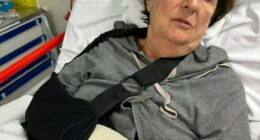An urgent warning has been issued to anyone suffering from Legionnaires’ disease to seek medical attention immediately after a man with the illness died in hospital.
NSW Health has recorded 12 cases of the deadly disease in the last month, all related to people who spent time in Sydney’s CBD between March 13 and April 5.
All but but one case required hospitalisation.
The department confirmed on Thursday that a man aged in 50s with underlying health conditions who contracted the disease died in hospital last week.
‘NSW Health expresses its sincere condolences to their loved ones,’ it said.
A cooling tower in the CBD is being decontaminated after Legionella bacteria was detected, with authorities now working to determine if it’s the source of the outbreak.
One patient was simply driving through Circular Quay when they were infected.
Anyone who was in Sydney CBD in late March or early April is being urged to monitor their health for symptoms of the disease.

NSW Health has recorded 12 cases of the deadly disease in the last month, all related to people who spent time in Sydney ‘s CBD between March 13 and April 5

NSW Health has recorded 12 cases of deadly Legionnaires’ disease, one of who died with the illness while in hospital last week (stock image)
Royal Australian College of General Practitioners spokesperson Dr Aadhil Aziz has warned that anybody can be affected by Legionella bacteria.
As a GP who specialises in chronic disease, including respiratory infections, he warned that patients are at risk not receiving the necessary treatment to recover if symptoms are ignored.
What is Legionnaires’ Disease?
Legionella bacteria, which is usually found in water bodies, causes an infection of the lungs which is a form of pneumonia.
The bacteria can be located in rivers, lakes, creeks and hot springs, but can also grow in artificial water systems such as cooling towers.
Illness usually occurs when a person inhales this bacteria in microscopic water droplets.
Most people recover from it but Legionnaires’ disease is occasionally fatal.
How does it spread?
‘There are lots of ways it can be spread,’ Dr Aadhil Aziz told Daily Mail Australia.
People catch the disease by breathing in the spray from a shower, tap, jacuzzi, water feature but also inhaling water particles in air conditioning and ventilation systems.
Unlike many viruses, Legionella bacteria generally isn’t spread from person to person but is possible in rare circumstances.

An infection of the lungs (a form of pneumonia) is caused by Legionella bacteria, which is usually found in water bodies (stock image)

All of the cases are related to people who spent time in Sydney ‘s CBD between March 13 and April 5, according to NSW Health (stock image)
What are the symptoms?
The illness takes anywhere from two to 10 days to develop, with symptoms including fever, often a severe headache and chills.
Common symptoms also include a cough, shortness of breath, muscle aches and pains and a loss of appetite.
‘It’s pretty much like any respiratory disease,’ Dr Aziz said.
‘Sometimes you might start with upper respiratory infection symptoms, like a runny nose or a sore throat; [it’s] very similar to what we had during the COVID pandemic.’
Atypical symptoms may include nausea, vomiting, diarrhoea and confusion.
Who does it affect?
Anyone can get the illness but symptoms may vary for patients.
‘Some people get very mild symptoms, and then others can get much more severe symptoms where you feel like you’ve been hit by a truck’, Dr Aziz said.
Those most at risk include those aged over-40, smokers, people with a chronic lung disease or a weakened immune system, or other underlying medical conditions.
‘We’re especially concerned if they get symptoms and they should seek medical treatment,’ he said.
‘But that doesn’t mean it’s just these populations. It can be anybody.’

Royal Australian College of General Practitioners spokesperson Dr Aadhil Aziz (pictured) has said anyone worried they might have symptoms of the disease should seek help immediately
What is the treatment?
The main treatment is antibiotic therapy, which should be started as soon as possible.
If left untreated, Legionnaires’ disease can lead to serious and even fatal lung infections.
‘If you push it off too long, it’s too late for anybody. It’s too late for us to give you better help, get you admitted [to hospital], get you on track,’ Dr Aziz said.
‘So if you’re going downhill, get help ASAP.’







